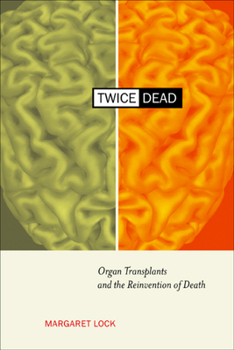Twice Dead: Organ Transplants and the Reinvention of Death
Select Format
Select Condition 
Book Overview
Tales about organ transplants appear in mythology and folk stories, and surface in documents from medieval times, but only during the past twenty years has medical knowledge and technology been sufficiently advanced for surgeons to perform thousands of transplants each year. In the majority of cases individuals diagnosed as "brain dead" are the source of the organs without which transplants could not take place. In this compelling and provocative...
Format:Paperback
Language:English
ISBN:0520228146
ISBN13:9780520228146
Release Date:December 2001
Publisher:University of California Press
Length:441 Pages
Weight:1.45 lbs.
Dimensions:1.1" x 6.1" x 9.0"
Customer Reviews
2 ratings
Excellent examination of a complex set of issues
Published by Thriftbooks.com User , 15 years ago
I second the opinion of Timmermans Stefan and rather than review, I'll simply recommend it to anyone interested in biotethics, or end-of-life issues or anyone who, like I, have had to face the question of whether or not to offer your loved one's organs for transplant while they lie in front of you dying. Along the same vein, though it explores a broader range of issues, is Robert Burt's book below, also recommended. Death Is That Man Taking Names: Intersections of American Medicine, Law, and Culture (California/Milbank Books on Health and the Public)
A masterpiece of social research
Published by Thriftbooks.com User , 22 years ago
Margaret Lock discusses how organ transplant interests fostered the notion of brain death in North America and Japan. Until recently, Japan did not accept brain death as a sufficient criterion of death, even when the Japanese had all the technology and medical skills to carry out organ transplantation. By contrasting the muted discussion about brain death in North America with the heated, well informed public debates in Japan, Lock makes readers uncomfortable. Are people declared brain dead in America really dead, or do neurologists simply assume that they are dead to allow transplantation to take place? When does death occur anyway; is it a process or an event? Should physicians determine death with technological guidelines, or should death be defined by the people who are the most implicated, like relatives? Lock does not provide easy answers to those questions but her exhaustive research indicates how a different consensus about brain death emerged in the East and the West.This book is a masterpiece of social research that does not succumb to cheap moralizing. Lucidly written, it is solidly grounded in anthropology but widely accessible. I strongly recommend it to anyone with an interest in medicine or anthropology.





